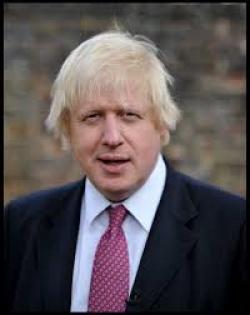The serious voting has now begun among Tory MPs for the successor to Theresa May. Tory MPs will now vote to reduce the field to two candidates who will then be put to the geriatric membership of the Party. In the meantime, the leading candidates are out-doing each other in being as hard-line as possible on the issue of Brexit and at the same time offering very lucrative financial promises to the Tory faithful.
There is apparently no limit to the largesse of the main candidates. According to the Financial Times, ‘Boris Johnson, the frontrunner, has said he will raise the threshold at which the higher income tax rate is levied, at a cost of £9bn a year; Dominic Raab, another hard-line Brexiteer, has pledged to reduce the basic rate of income tax by a penny in the pound every year he is prime minister; Jeremy Hunt, the foreign secretary, wants to lower corporation tax to the lowest rate in Europe, potentially carrying an annual £13bn price tag; Michael Gove, the environment secretary, suggested abolishing value added tax in favour of a ‘lower, simpler’ sales tax; while Sajid Javid, the home secretary, floated abolishing the top rate of income tax altogether’ (June 12)
All of these promises are quite clearly aimed at higher earners and wealthy pensioners – the Tory Party membership, in other words – rather than the majority of the population. Whereas not so long ago, there was apparently no ‘magic money tree’ Tory ministers now find after all that there is a veritable forest of them.
The Golden Buffoon is favourite for Prime Minister
Although in previous contests Tory MPs have a fairly solid track-record of not voting for the candidate who started as favourite, the bookies’ money is still on the Golden Buffoon, Boris Johnson, who, according to every poll taken, is the darling of the party membership. But if Johnson is popular in Conservative Associations, his bumbling approach to all serious issues, coupled with a complete absence of any guiding principles, have filled the more sober representatives of British capitalism with some alarm. In his approach to negotiations with the EU, Johnson typifies, as the Financial Times put it, ‘the fabled Briton abroad who believes if only he shouts loudly enough, the foreigners will eventually understand.’ (June 10) Moreover, his now infamous ‘fuck business’ remark will come back to haunt him. Typical of many representatives of business, the chairman of the Meggitt engineering group recently described him as ‘someone who possesses not the slightest moral compass’. The only faint hope, the businessman added, was ‘that he is quite capable of pivoting in any direction, once elected.’
Whoever is elected as the new Tory leader and new Prime Minister will be in exactly the same position as was Theresa May, between a rock and a hard place. There is not the slightest hint from the EU that there will be any further negotiation of the agreement reached with Theresa May last year. The choice facing the new leader will be either to accept the deal negotiated by May (with cosmetic changes at best) or a no-deal Brexit. Even leaving aside the forecast economic disruption that could come from a no-deal Brexit, it still looks unlikely that there is a majority in parliament for crashing out. Voting down Labour’s procedural motion against a no-deal Brexit on Wednesday was more a vote against it being a Labour motion as it was against the substance of it. So the crisis in the Tory Party and the crisis in parliament is set to continue into the autumn.
New Tory leader will not want to seek a ‘fresh mandate’
What will be the new Tory leader’s options? The short answer is, not many. After the all-time record low of 9 per cent of the votes in the Euro-elections and the drubbing in the Peterborough by-election, the last thing a new Tory leader will want will be a general election. Peterborough showed that the Labour Party has something the Tories do not have and are not likely to have for the foreseeable future – an active mass membership.
The Labour membership is a sleeping giant and it raised its little finger in Peterborough, to send hundreds of activists into fighting the by-election. Not only is there a mass membership waiting to be unleashed in a general election, but it is one that is overwhelmingly youthful and driven by a determination to end austerity and bring about genuine change ‘for the many and not the few’, to coin a phrase. The new Tory leader will not want to reassert his authority by seeking a ‘fresh mandate’. So the Brexit crisis will roll on.
We have argued, and still maintain, that the fundamental issue facing working class people in the UK is not the choice between membership of the EU or Brexit. It is capitalism and the austerity that comes with it – in terms of low pay, insecurity, damage to local government, education and health, a lack of affordable housing and a host of other issues. But we also need to be absolutely clear on the illusions that surround the Brexit debate. There is nothing whatsoever in Theresa May’s negotiated Brexit deal that is of any benefit to working class people. On the contrary, it threatens to make workers worse off in every respect: in their rights and safety at work, in food standards and in environmental standards, to name but a few.
The promises now being made by the candidates for the Tory leadership give a flavour of Tories what want from leaving the EU – an unregulated economy based on cuts in corporation tax (‘the lowest in Europe’) and tax cuts for the wealthy. Far from improving the lives of workers, a British ‘Singapore’ economy would only mean a faster race to the bottom, with even less job security, lower pay and no end to austerity.
Labour is right to oppose a Tory Brexit or a no-deal Brexit
Theresa May’s deal will put all the EU nationals currently living in the UK in the same position as the Caribbean migrants of the 1950s with their right to residency subject to ludicrous bureaucratic form-filling, in the face of truculent and uncooperative Home Office Immigration officials. The Windrush scandal threatens to multiply ten or a hundred times, in relation to those EU nationals currently resident in Britain. Let us repeat, there is nothing in May’s deal that is of benefit to working class people and Labour is absolutely right to oppose a Tory Brexit.
There is an idea current in the labour movement that somehow leaving the EU will in and of itself make the struggle for socialism ‘easier’, but this is an illusion. The struggle for socialism, or even the fight to defend workers’ rights and conditions at work, is less question of laws and regulations than it is a matter of how and to what extent the leadership of the labour movement are prepared to mobilise mass struggle for change. From where we are now, a Tory Brexit will make workers worse off in every respect and it leaves three million EU nationals in the UK swinging in the wind. We need to acknowledge these facts and we need to say loudly and clearly that we do not support any policies that make workers worse off. But if Theresa May’s deal offers nothing to working class people, a hard-Brexit, where the UK just crashes out without a deal, is potentially worse and, again, Labour is right to oppose it in parliament.
By voting against the Labour whip in the House of Commons, those ‘Labour’ MPs who effectively supported a no-deal Brexit, are playing with the lives and livelihoods of millions of workers and the security of all EU nationals here. Open selection was rejected at the last Labour conference, due to the weakness of some trade union leaders and the soft lefts around the Momentum leadership. But the relentless disloyalty and sabotage of Labour MPs cannot go unanswered and Open Selection needs to be back on the agenda as early as possible. There are many Labour MPs who will never reconcile themselves to the idea of a mass Labour Party with radical policies. It is inevitable that at some stage there will be new moves against Jeremy Corbyn from all the Chuka Umunnas and Chris Leslies who haven’t left yet.
The British capitalist class is faced with an historic crisis, its traditional political representatives, the Tory Party, being virtually useless to it. On the other hand, New Labour/Blairism is one of the most enduring legacies of Thatcherism. Faced with the nightmare unfolding in front of their eyes, in the shape of the Tory leadership contest, the British ruling class have few political assets to deploy; they may find that some of their best hopes lie in the right-wing of the Parliamentary Labour Party. When a new Tory leader is installed in July, therefore, watch out for a new, perhaps more serious, challenge to the Labour leadership.
June 13, 2019



